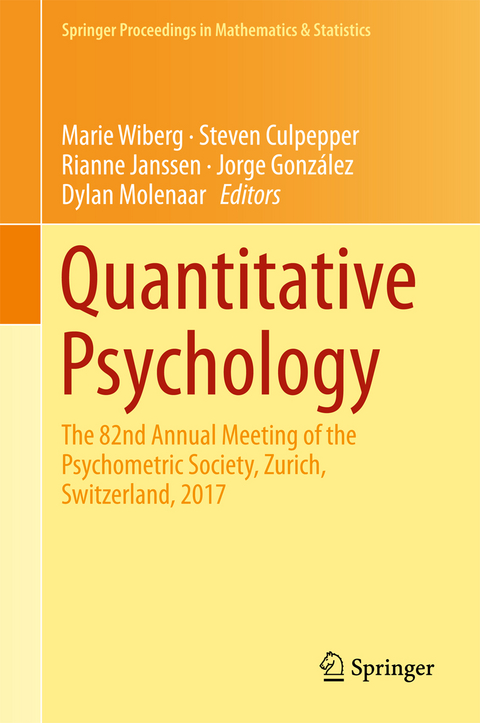
Quantitative Psychology
Springer International Publishing (Verlag)
978-3-319-77248-6 (ISBN)
This proceedings book highlights the latest research and developments in psychometrics and statistics. Featuring contributions presented at the 82nd Annual Meeting of the Psychometric Society (IMPS), organized by the University of Zurich and held in Zurich, Switzerland from July 17 to 21, 2017, its 34 chapters address a diverse range of psychometric topics including item response theory, factor analysis, causal inference, Bayesian statistics, test equating, cognitive diagnostic models and multistage adaptive testing.
The IMPS is one of the largest international meetings on quantitative measurement in psychology, education and the social sciences, attracting over 500 participants and 250 paper presentations from around the world every year. This book gathers the contributions of selected presenters, which were subsequently expanded and peer-reviewed.
Marie Wiberg is a Professor of Statistics with a specialty in psychometrics at Umeå University, Sweden. Her research interests include test equating, applied statistics, large-scale assessments and psychometrics in general. Steven Culpepper is an Associate Professor at the Department of Statistics, University of Illinois at Urbana-Champaign. His research interests include Bayesian statistics, cognitive diagnosis, large-scale assessments and psychometrics in general. Rianne Janssen is an Associate Professor at the Faculty of Psychology and Educational Sciences, KU Leuven in Belgium. She is chiefly interested in educational measurement and psychometrics, especially for applications in large-scale student assessments. Jorge González is an Associate Professor at the Faculty of Mathematics, Pontificia Universidad Católica de Chile. His research interests include statistical modeling of social sciences data, particularly in the fields of educational measurement and psychometrics. Dylan Molenaar is an Assistant Professor at the Department of Psychology, University of Amsterdam, the Netherlands, where he received his PhD degree in Psychology in 2012 for a thesis on "Testing distributional assumptions in psychometric measurement models with substantive applications in psychology." His research interests include item response theory, factor analysis, response time modeling, mixture modeling, modeling of intelligence test data, and modeling of genotype by means of environmental interactions.
Chapter 1. Optimal Scores as an Alternative to Sum Scores (Marie Wiberg).- Chapter 2. Disentangling Treatment and Placebo Effects in Randomized Experiments Using Principal Stratification: An Introduction (Reagan Mozer).- Chapter 3. Some Measures of the Amount of Adaptation for Computerized Adaptive Tests (Mark Reckase).- Chapter 4. Investigating the Constrained-weighted Item Selection Methods for CD-CAT (Ya-Hui Su).- Chapter 5. Modeling Accidental Mistakes in Multistage Testing: A Simulation Study (Thales Ricarte).- Chapter 6. On the Usefulness of Inter-Rater Reliability Coefficients (Debby ten Hove). Chapter 7. An Evaluation of Rater Agreement Indices Using Generalizability Theory (Dongmei Li).
| Erscheinungsdatum | 26.05.2018 |
|---|---|
| Reihe/Serie | Springer Proceedings in Mathematics & Statistics |
| Zusatzinfo | IX, 416 p. 73 illus., 42 illus. in color. |
| Verlagsort | Cham |
| Sprache | englisch |
| Maße | 155 x 235 mm |
| Gewicht | 799 g |
| Themenwelt | Geisteswissenschaften ► Psychologie ► Test in der Psychologie |
| Mathematik / Informatik ► Mathematik | |
| Sozialwissenschaften ► Soziologie ► Empirische Sozialforschung | |
| Schlagworte | Bayesian estimation • cognitive diagnostic models • Item response theory • Multistage Adaptive Testing • Psychometrics • psychometric society • Structural Equation Modeling |
| ISBN-10 | 3-319-77248-1 / 3319772481 |
| ISBN-13 | 978-3-319-77248-6 / 9783319772486 |
| Zustand | Neuware |
| Haben Sie eine Frage zum Produkt? |
aus dem Bereich


